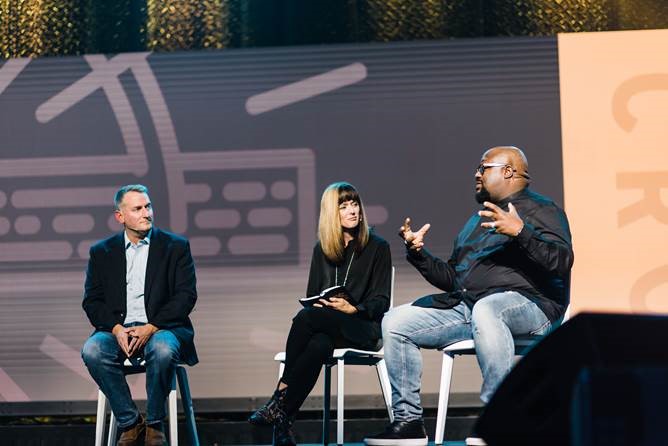
GRAPEVINE, Texas (BP) — Christians need to be more open about their personal and family brokenness to give hope to those inside and outside the church, panelists said Oct. 12 during the Southern Baptist Ethics & Religious Liberty Commission’s annual national conference.
 The panel addressed “The Sin-shattered Family: Gospel Hope for Broken Families and Broken Homes” during a main session of the conference at the Gaylord Texan Resort & Convention Center in Grapevine, Texas, a suburb of Dallas. About 950 people attended the three-day event — titled “The Cross-shaped Family” — that concluded Oct. 13.
The panel addressed “The Sin-shattered Family: Gospel Hope for Broken Families and Broken Homes” during a main session of the conference at the Gaylord Texan Resort & Convention Center in Grapevine, Texas, a suburb of Dallas. About 950 people attended the three-day event — titled “The Cross-shaped Family” — that concluded Oct. 13.
Jamie Ivey, an author and podcaster from Austin, Texas, told attendees, “I think actually what the world wants to see is broken people who are redeemed and loved, and instead … we’re leaving out our brokenness.”
What Christians should be sharing, she said, is: “[H]ere’s our family’s brokenness; here’s my past brokenness; here’s my current brokenness. Well look how amazing Jesus is that He pursued me, that He loves me…. That is something that the world is looking for.”
Church leaders can promote this in their members by being more open about their sin, Ivey said.
“I am always surprised [when] people tell me they have never heard their teaching pastors confess any sins on stage,” she said. “We would do a better job for our church people if they saw that modeled from the top down.”
Sam Allberry — global speaker for Ravi Zacharias International Ministries and formerly a pastor in Great Britain — told the audience a “massive obstacle” to openness among Christians “is this kind of church culture where people think, ‘I need to look good so that Jesus looks good.'”
That attitude “is killing our churches” and “cuts against the Gospel of grace,” he said. “We need to be real with each other. We’re [in the church] not because we’re good. We’re here because we know we’re not.”
Eric Mason, lead pastor of Epiphany Fellowship in Philadelphia, encouraged Christians to “run towards [their] brokenness with Christ in the power of the Spirit by faith, believing not only He can heal their brokenness in the family but He can also redeem it and use it.”
People outside the church “are hungry for the incarnation of the church, for us to be an incarnate community that lives in the city, loves the city … and reflects what biblical family is versus railing on the problems of the community,” he said.
Best-selling author Ann Voskamp said Scripture is central to living out Christianity in a home.
Christians should “acknowledge our brokenness and we are in dire need of hope,” she told the audience. “And when you have lost all hope, when you open up the pages of His Word, you find hope again. And when you’re looking for hope in the future, you find hope in God’s faithfulness in the past.
“Biblical hope is not waiting on good circumstances. It’s waiting on a good God.”
Her husband has led their family of nine to read the Bible every time they have a meal, Voskamp said.
“[T]his has been the most formational habit we have had as a family — that if you sit down at the table to eat any dead food, you make sure you get up from the table knowing that you have eaten living bread,” she said.
“[I]f we’re going to be Christ-centric, we need to be Word-centric.”
The church can help by living as the family God has established, Allberry said.
“[T]he Gospel creates family,” he told those in attendance and those watching on live stream. “It brings about family relationships that weren’t there beforehand. If we can make sure that our language about church family is not just lip service but expressing the spiritual reality, that’s got to be an amazing witness” to the world.
“You come to this group of people, and you will find family and you will become family,” he said of the invitation to those outside the church. “That’s powerful.”
In his Oct. 13 conference keynote address, Allberry said, “Our family is not just people who have the same last name as us but people who have been baptized into the same name as us, people who share the Lord’s table with us.”
Dan Darling, the ERLC’s vice president for communications, moderated the panel. Four other panels during the conference’s main sessions addressed the education of children, the strengthening of ministry marriages, sexual abuse and assault, and adoption, foster care, special needs and mental health.
















